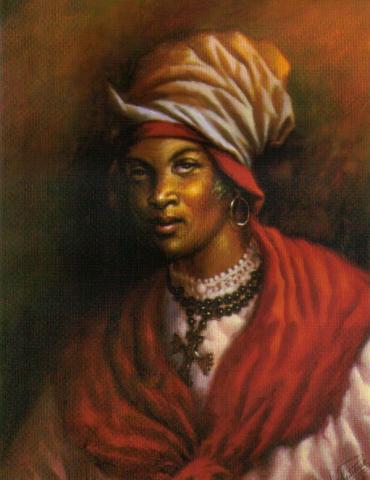KOSANBA Conference 2017

Colloquium XII occurs under the aegis of all the Lwa, and is dedicated to the life and oeuvre of Ati Max-G. Beauvoir.
The year 2017 marks the 20th anniversary of KOSANBA’s founding, providing an opportunity to reflect on where Vodou currently stands in relation to the past and the future. Time challenges our institutions, and religions as well as secular structures partake in this process. The Middle Passage transformed Vodou as it traveled from its sources in Dahomey and other sites in West Africa and the Kongo basin and met its French overlords in the Caribbean crucible. It continued its trajectory across five hundred years, both in Haiti proper and through its diaspora across the globe. The impact of Vodou on Haitian history and society is inarguable: it has been one of two primary cultural markers—language being the other—defining individual and national identity.
Now the challenges are multifaceted as Vodou spreads across countries and continents, making its presence known internationally, and as it incorporates adherents of many nationalities, ethnicities, and races who were attracted by Vodou’s foundational universality or called by the Deities themselves. In Haiti itself, however, the religion—while it is at last recognized—has suffered renewed and severe challenges in its very existence, as have all other indigenous systems confronting globalization.
This conference, then, examines the factors that have shaped the form, definition, and practice of Vodou in the contemporary moment, as well as the challenges it faces and its potential paths for the future.
We invite submissions based on the following themes:
Changes in and continuities with Vodou’s African origins
- How do the new geographies of Vodou impact the foundational belief system that marked an essentially “African” and neo-African world sense?
- How has that foundation changed over the centuries, as contrasted with original rural and urban sources on the African continent, in kinship patterns, laws of governance, and the like?
- Once those original African sources were transported to Haiti, what was the impact of persecutions installed by new governing elites, the Church, and North American cultural invasions?
Cultural and religious exchanges
- What exchanges has Vodou had with other world religions such as Islam, Kongolese Catholicism, the religious constructs of specific African ethnicities, Freemasonry, and European Spiritualism?
- What is the influence of the nation’s original inhabitants, the Amerindians?
- Hundreds of millions of individuals on all continents worship in ancestral systems, though this does not necessarily entail exclusivity in religious sentiments, sensibilities, and practices. How do these factors play out in a new century of global apartheid?
Colonial and other historical legacies
- How has Vodou responded to events such as the following? How do these historical developments continue to resonate in the present?
- French colonialism and a thrust toward a policy of assimilation among elites
- The Church’s policy pre- and post-Concordat, when Haiti was not made a “land of mission” because elites considered it fully Christianized already
- The decades of unimpeded development between 1804 and 1860, when Haiti found itself isolated from the world
- Early persecutions by state authorities
- The willful introduction of Protestant missions by the US Occupation to divorce Haiti from Catholicism and Vodou
Interdisciplinary connections
- Vodou in the twenty-first century is the subject of exciting new research in the fields of Caribbean Studies, African Studies, Black Studies, Religious Studies, Anthropology, History, Politics, Music, and the Visual Arts. What do these interdisciplinary approaches reveal about the present-day religious, political, and artistic landscape of Vodou?
Global and diasporic currents, and paths for the future
- How have the migratory waves of Haitians out of their lands affected the religion, starting with the first migrations toward Cuba, New Orleans, and elsewhere in the late eighteenth and early nineteenth centuries? The subsequent outward flow after 1915 also toward Cuba, the Dominican Republic, and other sites? The Global North beckoned, and Haitians responded. Moreover, since the religion remains at the heart of cultural life and beliefs in New Orleans, the 2017 conference provides an opportunity to reflect on the influence and evolution of Vodou in this particular context.
- What of the connections between other diasporic systems in the Caribbean and Latin America? Can the Lakou as a model survive transplantation, away from extended family patterns and the all-powerful primordial construct of ancestry?
- Might Vodou, in its spread and greater presence, lead to new cosmologies? Or to the sense of other possibilities and alternate routes to a sustainable living environment for the planet?
- In light of global dynamics of power and resource inequality, what is the ethical responsibility of researchers, and their impact as participant-observers?
Contact
Conference Contact: KosanbaConference@gmail.com